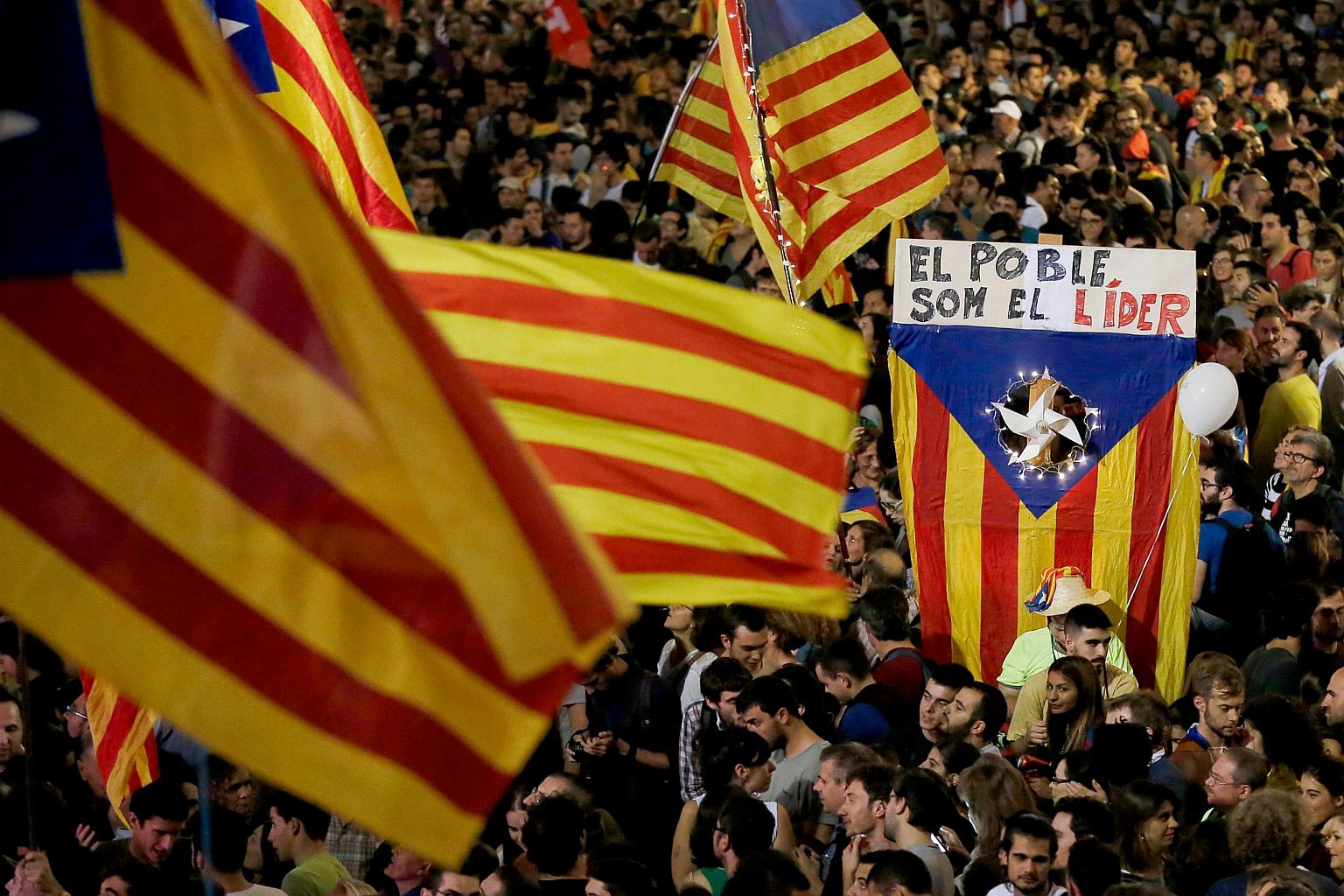Catalonia: What is unilateral declaration of independence?
Sign up now: Get ST's newsletters delivered to your inbox

A flag saying "The people lead" in Catalan is held up as people gather to celebrate the proclamation of a Catalan republic at the Sant Jaume square in Barcelona on Oct 27, 2017.
PHOTO: AFP
THE HAGUE (AFP) - Spain's Senate on Friday (Oct 27) voted to grant Madrid powers to impose direct rule on Catalonia, shortly after the semi-autonomous region's parliament approved a motion declaring independence.
Here are five questions about what it means to make a unilateral declaration of independence (UDI):
WHAT IS UDI?
The term was first coined in 1965 when the former Rhodesia's minority white government declared unilateral independence from British colonial rule. The process itself is when a new state is established within an existing country, declaring itself sovereign and independent without the consent of the entity, country or state from which it is seceding.
DOES CATALONIA HAVE A RIGHT TO DECLARE SELF-RULE?
"Any entity has the right to declare its independence. But to become a state that of course requires a territory, a population and authorities," said Jean-Claude Piris, a Brussels-based international law consultant and former EU legal services director for 23 years.
"But what matters most is recognition by the international community," he said. "Everyone has the right to issue a declaration of independence, but that in itself has no international consequence."
Piris said very few countries will recognise Catalonia and "I guarantee you no one will recognise them" in the EU.
"Therefore it will remain an empty declaration: Catalonia will not be represented in international organisations, they will not sit in the EU, they will not be able to do anything and legally they will remain part of Spain," he said.
IS CATALONIA'S UDI LEGAL?
That is a complicated question, and two important legal findings may help determine the answer, the experts say.
The first is a 2010 advisory opinion by the UN's highest tribunal, the International Court of Justice (ICJ), on Kosovo's declaration of independence from Serbia. The second is a 1998 opinion by the Canadian Supreme Court.
After being asked by the UN General Assembly to rule on the issue, the ICJ concluded that Kosovo's declaration "did not violate international law" or Security Council resolutions.
In a written opinion to the court, Spain argued Kosovo's declaration was "not in accordance with international law", saying it ignored "Serbia's right to sovereignty and territorial integrity."
IS QUEBEC CASE A MODEL?
In the case of Quebec, the Canadian Supreme Court advised in 1998 that people only have a right to secede when they are victims of colonisation, oppressed and exploited or are denied access to a federal government.
"It's really reserved for oppressed people who do not have the right to democracy, who are badly treated. But this is not the case at all for Catalonia, which enjoys democratic rights," said Piris, noting the Catalans are acting outside of the Spanish constitutional framework.
"I cannot imagine any international tribunal that would say that the right to self-determination applies to the Catalans. It's unimaginable," said Piris.
WHAT HAPPENS NEXT?
"What matters now is what will happen nationally and in the streets," said Piris. "Are there going to be demonstrations, barricades? Will people accept and submit" if Spain triggers Catalan guardianship... "or will there be violence?"
Spain "experienced a civil war not so long ago and just before World War II," Piris pointed out.
If Catalonia becomes an independent state, the implications "cannot be underestimated" said Narin Idriz, a researcher at the Hague-based Asser Institute.
"All European Union member states cherish their territorial integrity, they will not want the same thing to happen to them, therefore it will be very difficult to find any support," she said.


